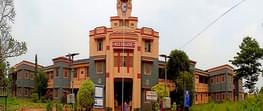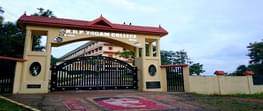Dr. Sreekala S has been working as an Associate Professor and Head of Zoology Department at D.B Pampa College Parumala, Pathanamthitta, Kerala. She has done M.Sc in Zoology, along with B.Ed, M.Phil and PhD as part of her education. Her passion and commitment for Zoology is clearly visible in her extensive experience and contributions to the field and she plays a crucial role in shaping the minds of aspiring Zoologists and instilling in them a deep understanding and appreciation for the subject. Being the Department Head of the DB Pampa College, she works collaboratively with other faculty members to develop a comprehensive curriculum, strategize curriculum updates, implement innovative teaching methods and create a supportive and engaging environment that can foster both academic and personal growth of students. Her research interests encompass diverse areas of zoology, enabling her to provide students with the latest advancements and insights in the field. And for her wonderful contribution in the education sector, she has received many recognitions and accolades.

Being the Head of the Zoology Department, what are your responsibilities towards the students?
As the Head of the Zoology Department, my roles and responsibilities towards the students encompass a wide range of tasks. And I am primarily responsible for providing academic leadership within the department by overseeing curriculum development, course scheduling, program evaluation and ensuring that the courses offered meet the industry standards and requirements. Next, I am responsible for mentoring and guiding students, offering support on their academic and career paths, helping them navigate through their program requirements, providing recommendations for internships and research opportunities, and assisting with any challenges they may encounter during their studies. Apart from all this, as I am actively involved in teaching courses related to zoology, I need to design and deliver lectures, practical sessions, organize field trips to enhance students' understanding of the subject matter, conduct research in my area of expertise, and encourage young minds to participate in research projects. Advising students on their course selection based on their interests and career goals, providing guidance to them on study abroad programs, graduate school options and job prospects and creating awareness among students about the benefits of studying zoology are some of my other key responsibilities. Last but not the least, promoting diversity and creating an inclusive learning environment within the department and organizing seminars, workshops, and guest lectures by collaborating industry experts and leaders and encouraging students to attend conferences and symposiums is also part of my day to day job.
How do you establish healthy relations with the students and fellow faculty of your college?
We firmly believe that establishing healthy relationships with students and fellow faculty is essential for creating a positive and collaborative learning environment. And being the Head of the Zoology Department, I strive to build strong connections with everyone by maintaining an open and approachable demeanor. And I regularly interact with my staff members and students in a friendly environment and treat young minds as my own children and instead of overwhelming them with strict instructions, I have created a comfortable atmosphere where they feel free to ask questions, share their thoughts, and express any concerns they may have. In other words, I establish good relations with everyone by fostering a sense of trust and respect, encouraging open dialogue and constructive feedback among everyone and ensuring that their voices are heard and valued. And when it comes to fellow faculty members, I emphasize the importance of teamwork and collaboration and actively engage myself and others in discussions and meetings. Apart from all this, by valuing their expertise and contributions, recognizing their work on time and providing quality education and research opportunities in the zoology field, I ensure relations between me and my staff remain strong, positive and respectful.
How do you bring in a practical and industry oriented approach towards subjects?
For the purpose of ensuring an industry driven and practical learning approach towards subjects, we have deployed various strategies to make the subject matter relatable and applicable to everyday life. And the very first approach is that we use very simple language and incorporate relevant and relatable real life examples to illustrate concepts and theories while teaching students. For instance, when teaching about animal behavior, I use examples of human behavior or popular animal documentaries to help students understand complex concepts in a familiar context. We also use case studies to highlight the practical applications of zoology in various industries and help students gain insights into the practicality of zoology in addressing industry challenges. Field trips to Zoos, wildlife rehabilitation centers, research institutes, and other relevant locations are organized by us on a regular basis to give an overview of ground scenarios and hands-on experiences to students. All this also helps students to observe and interact with animals and professionals in the field. Apart from this, professionals and guest speakers are invited from different sectors of the industry to share their experiences and insights with the students, shed light on industry standards and potential career paths and provide valuable perspectives on how zoology is applied in their respective fields. Last but not the least, we are using the latest technologies, virtual simulations, online databases and interactive tools to bridge the gap between theoretical knowledge and practical application.
How do you strategize and update the curriculum to make it befitting for the students?
We firmly understand the fact that strategizing curriculum development and implementing changes in a structured manner is very crucial to ensure that the Zoology program remains relevant and beneficial for students. And to ensure we have an industry oriented curriculum that can benefit students in developing demanding skills, we keep ourselves informed about the latest advancements and developments of the Zoology field and also engage everyone in professional research work to identify new emerging technologies and industry practices. We have also integrated the virtual labs into the curriculum to provide students a simulated environment to perform experiments, collect data and analyze results. This initiative is in the final stage of development and will soon be released for students to use on a regular basis. Apart from this, we provide students with opportunities to experience the dissection process and gain hands-on knowledge if they choose to do so. This approach ensures that they receive a well-rounded practical education, even in areas that are no longer mandatory. Students are also involved regularly in research and project work so that they can delve deeper into specific topics of their interest, conduct their own investigations, present their findings and develop critical thinking, problem-solving and communication skills. Lastly, we are focusing on improving our teaching methods by adopting a learner-centered approach. This includes facilitating discussions and encouraging active participation of students in classroom activities.
Check D.B Pampa College Parumala Courses & Fees
Which best practices are offered by your department to the students to help them gain necessary skills?
We provide regular mentorship along with personalized guidance to students to help them gain necessary skills and identify their strengths and improvement areas. And through these regular interactions, we help students to improve their existing technical and soft skills and build new ones required for success in the field of zoology. We also promote creativity and independent thinking among students and encourage them to actively participate in events like environmental days and design posters or create animal life cycle models, so that they can showcase their creativity and problem-solving abilities and explore their interests. Project-based learning is another approach we embrace and in this approach we encourage students to choose topics related to their surroundings or issues they feel strongly about and then make a project or prototype to solve that issue. All this in return assists students to develop strong research, analytical and problem-solving skills in them and the feedback we provide to them post evaluating their project helps them understand the depth of their work.
How do you prepare your students to deal with the outside competitive world?
Helping students cope with the high competition in the outside world is a priority for us, hence we have taken a personalized approach to know each of them on an individual level and also make consistent efforts to know about their family background, financial status and personal interests. Although this process is time consuming, it helps us to gain a comprehensive understanding of each student's circumstances and aspirations.
And once we are done collecting all the required information including interests and strengths of students, we provide tailored and personalized guidance along with required mentorship to them. We also held discussion sessions to make students aware about the latest industry trends and potential career opportunities. Additionally, we emphasize on fostering and developing critical thinking, problem-solving, communication and teamwork skills in students that are highly valued in the outside world. We regularly assign presentations and group projects to students and also conduct debates to enhance communication skills of students and encourage them to think creatively and analytically. Along with this, exposure to the real world is provided to young minds through internships, research opportunities and collaborations with industry professionals and these experiences in return allow them to apply their knowledge in practical settings and build networks that can facilitate their entry into the competitive job market. Last but not the least, we strive to instill a growth mindset in students, offer support systems in the form of academic resources, tutoring and study groups and encourage them to be resilient and adaptable to embrace challenges.
What do you see as the greatest strengths of your department and how it can be enhanced?
One of the greatest strengths of our department is our faculty members, who are highly educated and experienced in their respective areas of Zoology and are also dedicated and committed to the success of our students. Also, our teachers use a collective approach and work together to identify the issue and take required steps to provide necessary support and guidance whenever students face any academic and non-academic challenges or exhibit troublesome behavior. This collaborative approach also ensures that students receive the attention and resources they require to thrive academically and personally.
Effective communication is another strength within our department, because we have prioritized open and transparent communication among faculty members and with our students and regular meetings, discussions and feedback sessions are held regularly which ultimately allow us to exchange ideas, share insights and address any concerns or issues. Another benefit of this is that we stay informed about student progress, challenges and achievements and accordingly foster a supportive and engaging learning environment to provide them timely guidance.
And I firmly believe that to enhance our strengths, we should focus on developing and expanding our faculty's professional development opportunities and organize faculty development programs, encourage them to attend conferences and research collaborations. Because, when we provide avenues for continuous learning and staying updated with the latest advancements in the field of Zoology to our faculty members, they can bring new perspectives and knowledge to their teaching and mentorship roles. Apart from this, we can explore innovative methods of communication and leverage technology, such as online platforms, discussion forums, and virtual office hours all of which can create more accessible channels for interactions between students and faculty members. This approach will not only foster stronger connections but will also enable efficient information sharing. Last but not the least, we can enhance the strength of our department by creating mentorship programs within the department and pairing students with such mentors who align with their interests and can provide personalized guidance, career advice and academic support.
Click D.B Pampa College Parumala Placements
When you joined this college, what was your vision for it and how are you trying to achieve the same?
When I joined this college in 2013, my vision was to transform the Zoology Department into a well-equipped and modernized learning environment that would provide students with the best possible educational experience, because at that time, the department lacked essential facilities, including computers and modern equipment. And to make my objective come true, I regularly engaged myself in extensive meetings and discussions with the college principal and management to let them know how we can upgrade the infrastructure of our college.
And now I am glad that through persistent efforts and advocacy, I was able to secure the necessary support and resources and with everyone’s support, we successfully equipped our lab with modern facilities, ensuring that students have access to cutting-edge equipment and technology for practical learning. In addition to this, we have established a museum in the college campus to enhance the learning experience of young minds by showcasing them specimens and artifacts related to zoology.
Furthermore, a separate space equipped with advanced instruments was also put in place to help students gain hands-on experience in using sophisticated equipment relevant to the field of zoology. Also, initially our Department didn't have the resources to support a postgraduate program, but with concerted efforts and resource allocation, we were able to secure the necessary infrastructure and faculty support to offer a comprehensive postgraduate program, further enhancing the academic offerings and opportunities for our students.
Which extracurricular activities are organized in your college to enhance the skills of students?
A diverse range of extra-curricular activities are organized by our college to enhance the skills of our students and expose them to real-world challenges in the field of zoology. And the very first initiative we have adopted is that we promote farming and create awareness among students about the importance of agriculture and its connections to Zoology by arranging sessions. We have also established a butterfly garden where we cultivate plants specifically chosen to attract butterflies and students are regularly made part of these activities so that they can learn about the symbiotic relationship between plants and insects and gain practical knowledge about butterfly species and their life cycles. Along with this, we motivate our students to draw pictures and make Zoology related models to express their creativity and explore their artistic skills while deepening their understanding of various zoological concepts. And once students are ready with their models, we display their models in the lab for the purpose of creating a visually engaging and informative space for other students and visitors.
Additionally, we involve students in field work and encourage them to observe and collect specimens from their surroundings. For instance, in collaboration with local fishermen in Azheekal Beach, we motivate students to explore the marine ecosystem and identify different types of fish and other marine organisms and this hands-on experience not only increases their knowledge of marine life but also instills a sense of curiosity and connection to the field of zoology. Apart from all this, events like workshops, seminars, guest lectures are conducted by our college on a regular basis and by interacting with professionals and researchers, students gain insights into the practical applications and potential future paths within the field.
Any valuable advice which you would like to share with the students for a prosperous career ahead?
I would like to advise my students to prioritize their education and establish a strong foundation before considering other life commitments. No doubt in the fact that societal expectations and financial constraints will always be there, but I would encourage them to not to marry until they have obtained a solid educational base and financial stability. Hence, all in all, they should focus on acquiring knowledge, skills, and if possible should definitely go for Masters or pursue some courses or certifications post their graduation, so that they can get better employment opportunities. Apart from this, students who have unique talents and passion for arts and crafts like making best out of waste, should continue nurturing those talents and hobbies along with their education, because these things can give them a better perspective and benefits in future careers. Also, as it is a known fact that individuals may have different interests when it comes to academics, research, advanced degrees and entrepreneurship, hence I would suggest ambitious youths to explore all possible options as per their own interests, strengths and aspirations.


.jpeg?h=132&w=263&mode=stretch)
.jpeg?h=132&w=263&mode=stretch)



.jpeg?h=78&w=78&mode=stretch)
.jpeg?h=78&w=78&mode=stretch)



![Bishop Abraham Memorial College - [BAM]](https://image-static.collegedunia.com/public/college_data/images/appImage/662_BISHOP_APP.jpg?h=111.44&w=263&mode=stretch)













.jpeg?h=72&w=72&mode=stretch)
.jpeg?h=72&w=72&mode=stretch)

.png?h=72&w=72&mode=stretch)
.jpeg?h=72&w=72&mode=stretch)
.png?h=72&w=72&mode=stretch)


.png?h=72&w=72&mode=stretch)
.jpeg?h=72&w=72&mode=stretch)
.jpeg?h=72&w=72&mode=stretch)
![Parumala Mar Gregorios College - [PMG] Valanjavattom](https://image-static.collegedunia.com/public/college_data/images/logos/147826477411111.jpg?h=72&w=72&mode=stretch)




![St. Mary's College - [SMCM] Manarcadu](https://image-static.collegedunia.com/public/college_data/images/logos/1455774989emblem.jpg?h=72&w=72&mode=stretch)


![Bishop Moore College - [BMC]](https://image-static.collegedunia.com/public/college_data/images/logos/1395653553669.JPG?h=72&w=72&mode=stretch)


![T.K. Madhava Memorial College - [TKMM]](https://image-static.collegedunia.com/public/college_data/images/logos/1455703509loho.png?h=72&w=72&mode=stretch)



![Bishop Abraham Memorial College - [BAM]](https://image-static.collegedunia.com/public/college_data/images/logos/1452861169col662.jpg?h=72&w=72&mode=stretch)

Comments